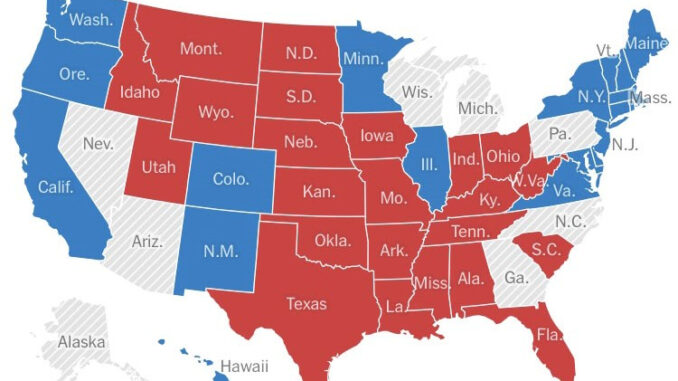
11/05/2020
Alexander Wolfe | Staff Columnist
As of Wednesday at 12 p.m., the election is still very much up for grabs, but pundits from wall to wall are scrabbling for attention. Biden’s campaign manager says Biden is on track to win, Trump himself said he had a big win Tuesday night, and Twitter was full of verified pollsters calling states one way or another.
The two biggest shocks? We woke up to Alyssa Milano agreeing with Ben Shapiro’s criticism of President Trump on Twitter and that the Fox News prediction center was correct about Arizona hours before anyone else. Yet there was something else nagging on the minds of Democratic strategists in the wee hours of the morning as Rachel Maddow and Joy Reid called party operatives and other insiders on the MSNBC broadcast for election therapy sessions: the fate of Florida.
Florida, our most gun shaped, memeable, election-derailing state, is officially a safe, Republican stronghold for at least the next 20 years. Gone are the 2008 and 2012 victories that propelled former President Obama to his presidencies, and arrived are the foreseeable waves of conservative politicians traveling to Washington to espouse the views of the state most vulnerable to conspiracy theories.
Marjorie Taylor Greene may have been elected from Georgia’s 14th Congressional District, but ProPublica, Vox, and Vice News estimate QAnon is growing more rapidly in Florida than in any other state. Conservatives in Florida are becoming more accepting of the QAnon conspiracy, as Latinx support Democrats have come to rely on dwindles away.
This is the crux of the issue: Latin American voters are no monolith. Cuban and Venezuelan Americans are different than other citizens from other Central or Southern nations. Cubans and Venezuelan Americans are, on average, more wealthy, educated and politically conservative.
These Americans have immigrated from or are the descendants of immigrants from more oppressive socialist dictatorships: Castro in Cuba, and Maduro and Chavez in Venezuela. Opinions of those regimes aside, the sharply negative view these conservative Latinx voters hold regarding their former nations is an undeniable driver of their politics, and of the results in Florida last night.
While Biden performed well enough in Broward county, with its larger Black population, his numbers in Miami-Dade, a traditional Democratic stronghold where the question of turnout was more important than the question of who the turnout was for, was nauseating for Democrats.
Biden’s 8-point victory in the district is the smallest Democratic margin in decades. Hillary Clinton carried the district by 30 points in 2016! Assuming the results have been tabulated correctly, this presents a 22 point shift in the state’s most important district in the favor of Republicans. Debbie Wasserman-Schultz, a representative running in Florida’s traditionally safe Democrat 23rd district within Miami-Dade only won by .8 points.
This one district shift is one of, if not the most, cataclysmic shifts in American history. Democrats had begun to sound the alarm in Florida two weeks before the election, but no one could have predicted such a significant change would occur in just 4 years.
The influx of Latinx voters into Florida made some Democrats more confident about this election, but more keen observers noted the strong aversion to the word socialism among many of these immigrants. Let’s get one thing straight, Biden is no socialist, at least in the context of authoritarian politics, but the Republican effort to smear Biden by calling him a socialist seems to have been incredibly effective in Florida.
Bottom line: The myth of the swath of motivated, well-educated suburban Florida liberals is dead. While those individuals still exist, the wave of conservative Cuban and Venezuelan Americans is closing the door on any chance Democrats have to turn Florida blue.
In 2018, Democrats ran Andrew Gillum for governor, an incredibly popular and charismatic candidate who was a talented speaker. He lost by half a point, largely due to a lack of enthusiasm among liberal Latinx voters and a corresponding enthusiasm among conservative Latinx voters to support the current governor Ron DeSantis.
In the larger context of national politics, some Democrats have found it trendy to talk about the doom of the Republican party, and I have certainly found myself in that line of conversation before.
Regardless of how many white votes Democrats can strip away from Republicans in any given year, if Republicans can successfully galvanize Latinx turnout within the current iteration of their party, conspiracies, prejudices and all, Republicans will always have a chance to win a national election.



